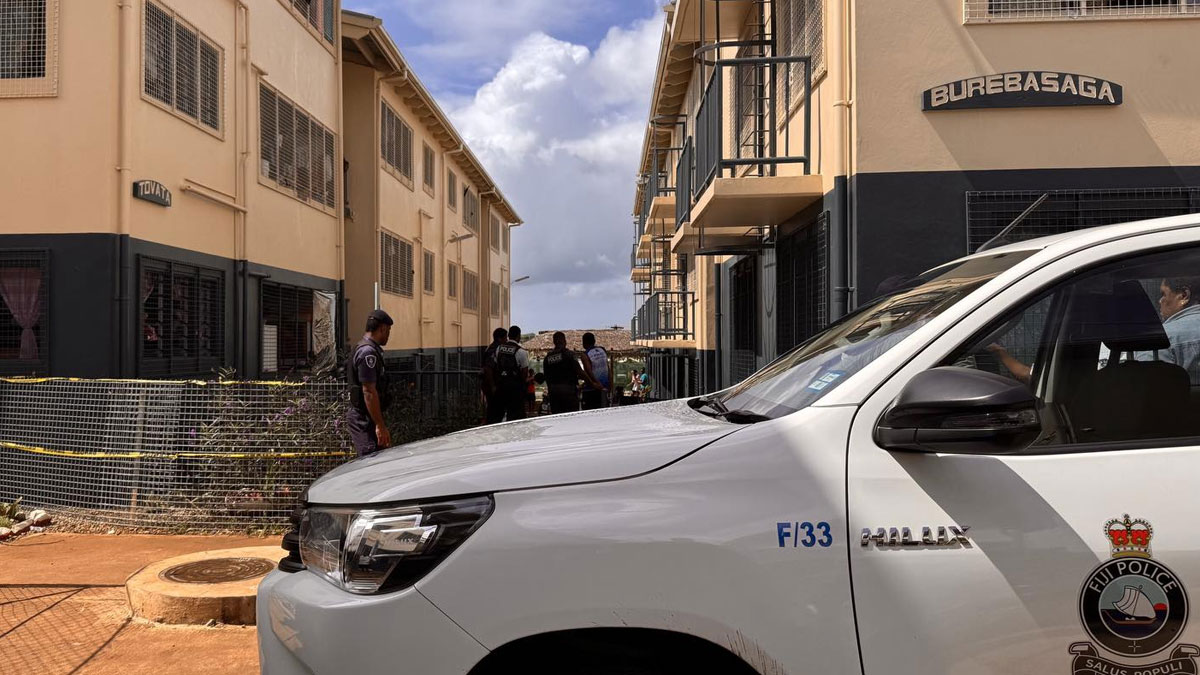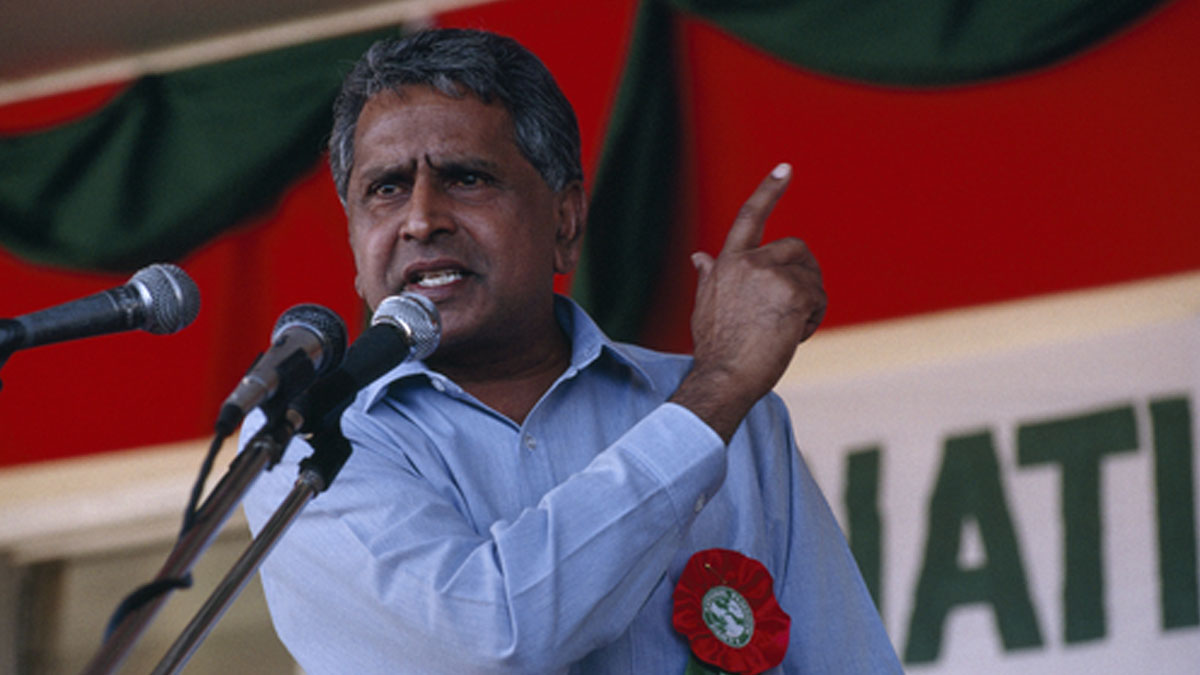
Former Leader of the Opposition, former Judge of the International Court of Rwanda, former National Federation Party Leader and former Attorney General, Jai Ram Reddy has passed away.
Reddy was the Leader of the Opposition from 1992 to 1999, Attorney General in May 1987, President of the Court of Appeal in 2000, and 2002 to 2003, and Judge of the International Court of Rwanda from 2003 to 2008.
He served as Leader of the Opposition on two occasions from 1977 to 1983 and from 1992 to 1999.
Reddy was also the first Indo-Fijian to be invited to speak to the Great Council of Chiefs.
His daughter, Helen said in a tribute on Indian Newslink that they are sorry to report the death of Jai Ram Reddy, a distinguished lawyer and judge of Fiji in Auckland on Monday, August 29th, 2022.
He was 85 years old.
In 1993, Reddy had said that he offers a vision which sees this beloved land of ours united in its diversity, forged out of its adversity and built on trust.
He had said he offers you a vision of Fiji which historians will say that, amid tragedy, we found courage and wisdom, and foresight and determination to lead the nation away from the precipice into a prosperous future.
Reddy had said that he can only hope that his vision for this most wonderful of nation will fulfil its promise.
He said he can only pray that we who have the moment at hand will find the courage, the strength and the determination to let the past be the past and build a nation that will stand not just to 20/20, but down through the centuries.
Helen Reddy says this moment asks a lot of her and all of us.
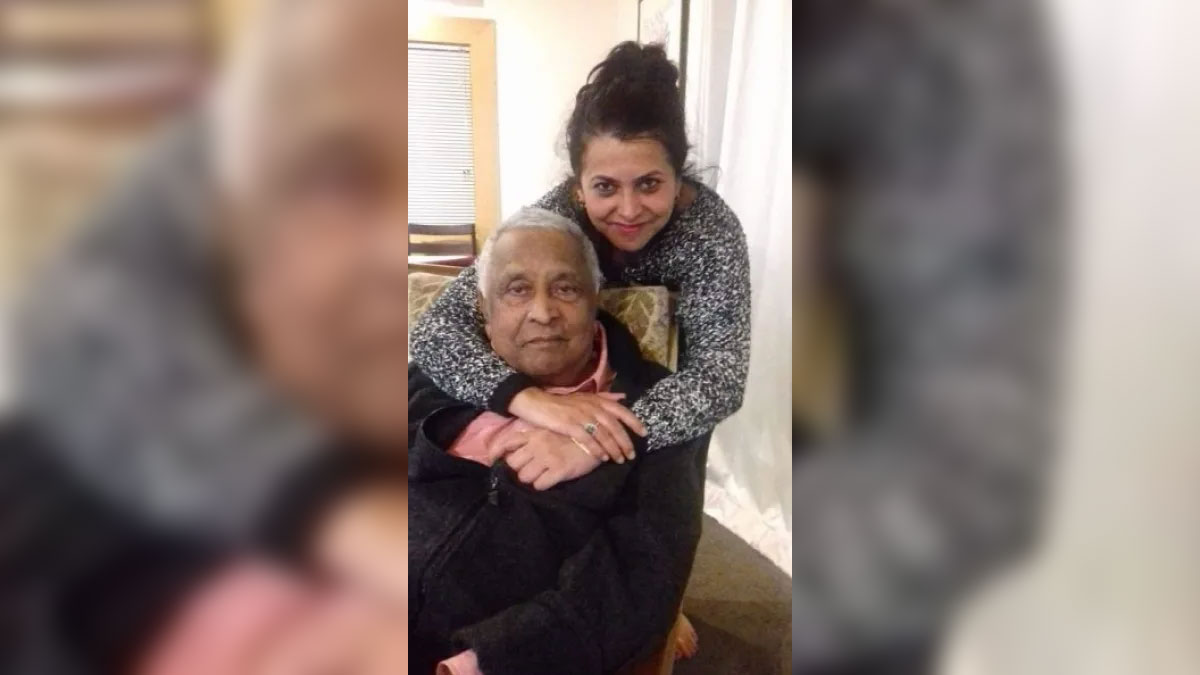 [Jai Ram Reddy with his daughter Helen Reddy (Photo Supplied)]
[Jai Ram Reddy with his daughter Helen Reddy (Photo Supplied)]
She says she writes the words with a heavy heart but also a sense of great pride and privilege which is only afforded to her because she happens to be the daughter of lawyer, judge, and Indo-Fijian statesman, Jai Ram Reddy.
She says historians, political commentators, and analysts will define their narratives about her father.
Helen says she is a daughter who simply seeks to celebrate and mark the life and legacy of her father.
This is a personal perspective about him and his status in law and Fiji’s national political arena from Helen Reddy :
I am conscious that many of those who will read this piece are descendants of indentured labourers who were brought from India to Fiji during colonial rule.
Like many of their generation, my wonderful grandparents, Pethi and Yenkatamma Reddy were farming folk who wanted a better future for their children. They worked hard and saved to send their eldest son, Jai Ram, to study law in New Zealand.
Their dreams were realised and my father was admitted as a Barrister and Solicitor in 1960.
Further to his admission to the New Zealand Bar, Dad returned to Fiji and enjoyed a long and illustrious career as a lawyer. I never had the opportunity to observe my father in the courtroom but I have heard and read much about his advocacy skills and fine legal mind.
His areas of practice were broad but I think he was particularly invested in criminal law and practice. I understand that he could be a Pitbull in the courtroom and had an unwavering commitment to his clients. International Criminal Tribunal, Rwanda
Whilst I missed observing my father’s lawyering skills, we were fortunate to observe him when he presided as a jurist at the International Criminal Tribunal of Rwanda (ICTR) between 2003 and 2008. We visited him in Arusha, Tanzania in 2007. He was sitting on a bench that comprised two other international jurists. The four defendants were military men accused of genocide against the Tutsi population in Rwanda.
I recall Dad challenging one of the Canadian advocates on a technical point to which the advocate responded; “Judge Reddy always asks the difficult questions.”
He was considered one of the finest judges there.
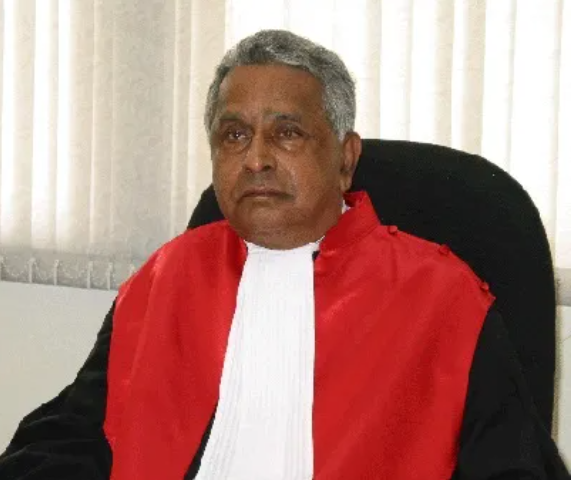 [“Judge Jai Ram Reddy always asked difficult questions” (INL File Photo)]
[“Judge Jai Ram Reddy always asked difficult questions” (INL File Photo)]
As a lawyer, I found the proceedings fascinating and as a daughter, I felt very proud.
My father was a Senator in the early 1970s but his political career really started when he was elected as Leader of the Opposition following the elections in 1977.
Politically, dad was a social democrat with liberal instincts. He consistently argued for equity, social justice, and inclusive society. He vehemently opposed the death penalty, arguing that it offends the inalienable right to life and constitutional norms.
Multiculturalist and Pluralist
He was demonstrably a multi-culturalist and pluralist. He supported the legitimisation of same-sex unions and led the parliamentary debate against French nuclear testing in the Pacific.
Turning to his political legacy, I am cognisant of how urgent and prescient my father’s vision and brand of politics might feel, given the rise and global reach of populism and identity politics.
Dad firmly believed that leadership in the Fijian context required moral courage, empathy for ‘the other’ and an understanding of history and context.
I developed a better understanding of the importance of his pluralist approach and commitment to working across the political aisle for the greater good of all communities in Fiji.
I also developed an appreciation of how the colonial legacy of divide and rule cultivated the deep racial divisions, mistrust and communalism which have featured so tragically in the Fijian political landscape. An appreciation of context is so important, but dad’s message was that we all have a collective responsibility to reflect, critique and overcome the historical legacies, structures and values which impede the art of empathy and compromise.
Other interests
It would feel incomplete not to acknowledge my father’s other interests. He loved literature, philosophy, and comedy. Those who knew him intimately will recall his reverence for the prose of William Shakespeare and his extraordinary ability to recite Shakespearean sonnets and soliloquies – even when his Alzheimer’s was well-advanced.
As a young, idealistic student, he developed an interest in philosophy and his outlook and perspectives were shaped by both Eastern and Western writers and intellectuals.
Possessing a dry, acerbic wit, he enjoyed satire and comedy, particularly the British variety, and was an ardent fan of all things involving Monty Python and other comics of that tradition.
He also liked old Hindi songs, but he loved Ghazals the most.
He was not the greatest singer but after a couple of glasses of red wine, he would sing along to those old melodies with much gusto at dinner parties. It made him happy.
Highs and Lows in life
Like all of us, my father’s life was punctuated by both highs and deep sadness.
My dear brother Sanjai’s untimely death was devastating for dad. Despite his own grief, he was able to be a wonderful and supportive grandfather to my niece and nephew as well as continue a demanding job as a jurist at the ICTR.
It is indisputable that dad had an intellectual disposition and for much of his life, his interests and preoccupations were principally cerebral in nature.
However, with age, he became less preoccupied with such matters and his well-known social reticence and ‘short fuse’ receded considerably and was replaced by a person who was more relaxed and at ease communicating with others on a more personal and intimate level.
I will treasure the memory of some of the conversations that we shared in his later years.
Dialogue with the Great Council of Chiefs
Following the military coup of 1987, my father had the singular honour of being the first Indo-Fijian to be invited to speak to the Great Council of Chiefs.
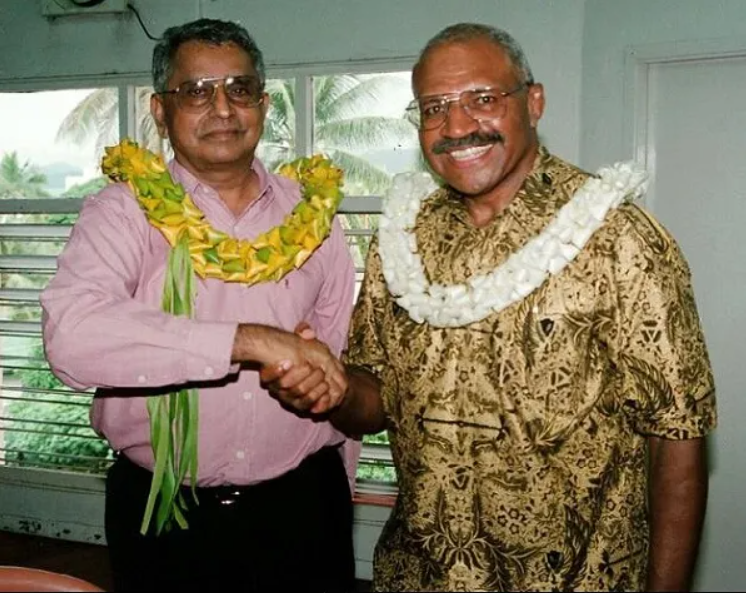 [Jai Ram Reddy with Sitiveni Rabuka (Reuters Photo)]
[Jai Ram Reddy with Sitiveni Rabuka (Reuters Photo)]
It was a seminal moment as Fiji was on the precipice of ratifying a progressive new constitution.
In his speech, he talked about the respective fears and interests of both the indigenous Fijian and Indo-Fijian communities. He also spoke of the importance of power-sharing in the context of a politically, and socially fractured Fiji following the military coups in 1987.
I quote his final words from that speech:
“In one of his nation’s darkest hours, that courageous and visionary leader, Franklin Roosevelt, said, and I quote: ‘To some generations, much is given; of other generations, much is asked. This generation has a rendezvous with destiny. Much was asked of Ratu Cakobau’s generation of Chiefs. Much is asked of this generation of Chiefs. Much is asked of us all. Let us, therefore, gather our courage and set ourselves united to the finishing of the noble task to which our history, our heritage and our motherland now call us. This generation must keep its rendezvous with destiny. And to future generations, much will be given.”
Defining moments squandered
From the perspective of many, that defining moment was squandered and the tragic events which have taken place in Fiji over the past two decades speak volumes.
I know how profoundly disappointed my father was that his vision of an inclusive society was mercilessly rebuked by what he described as ‘narrow-minded partisanship’.
Of course, another military coup then took place and the rest is history.
However, notwithstanding those events, may the arc of history bend towards that rendezvous he spoke of on that hopeful occasion. Let his dream of a fully democratised Fiji be realised and let it be a Fiji with fair and accessible rights to political representation, education, and economic parity for all its diverse citizens.
I conclude by quoting a few words which seem so fitting on this saddest of occasions. These are the words of that great, visionary leader Dr Martin Luther King Jr: “There comes a time when one must take a position that is neither safe, nor politic, nor popular, but he must take it because conscience tells him it is right.”
Rest in peace dear Dad.
Om Shanti. Gole ena vakacegu
Helen Reddy is the daughter of the late Jai Ram Reddy. She is a Barrister and Solicitor, practising in London. The above article, a tribute to her father, posted by Sri Krishnamurthi, a fellow Journalist and a friend of Indian Newslink.
Stay tuned for the latest news on our radio stations

